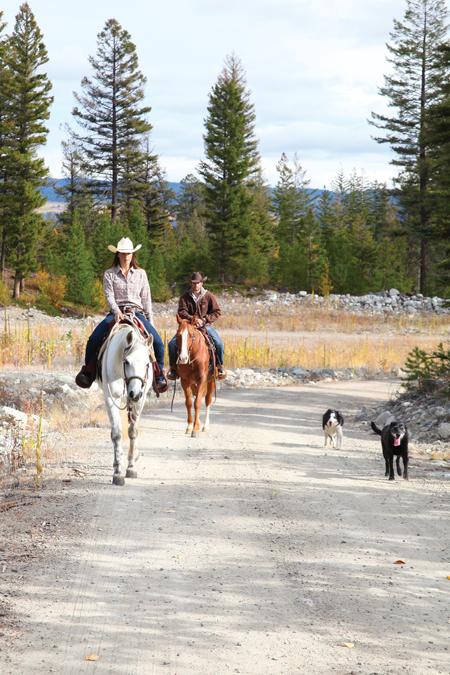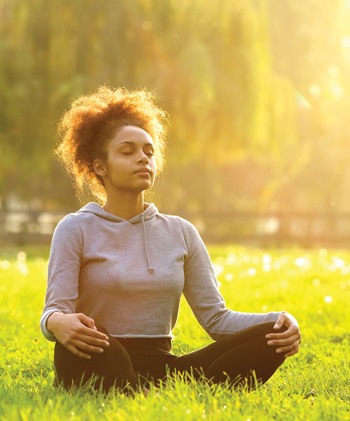
Stress. It’s a word that seems synonymous with today’s culture. It’s almost like if you’re not stressed, you’re not breathing. Or is it just me? But how do us equestrians stress less?
Studies have shown that spending time grooming, handling and riding horses helps lower stress hormones.
Imagine taking a long trail ride on a Friday afternoon. You can inhale fresh air mixed with the scent of your favorite horse while exhaling all of the stagnant office air. You relax your tight back and shoulders with the rocking and rolling of your steed’s stride through the woods. You exorcise the office demons while currying loose hair and mud off your horse. And then there’s sweating out bad juju while stripping stalls and scrubbing buckets.
We all know the benefits as horse owners, but what about managing our stress away from the barn?
Take a Walk
Feeling uptight during the workday, but you can’t check out until 5 p.m.? Hit “Ctrl-S” and step away from the computer. Take five minutes to stretch your legs and go for a walk, whether it’s around the block or just within the halls of the building. Take this opportunity to do some shoulder rolls and neck stretches.
If you get away from the office, taking a minimum 10-minute walk can give you the same benefits as meditation because of the repetitive movements of your body’s large muscle groups.

Meditate on You
Life can lead us to a harried existence, which is why meditation has grown in popularity. Meditation, or mindfulness, helps you take a step away from the rush of daily life and turn down the volume in your mind.
Ronald Siegel, PsyD, is an associate clinical professor of psychology at Harvard Medical School who has recently released some guided recordings for free online at www. mindfulness-solution.com.
There are also a host of apps, websites and videos online that offer guided meditation. Find your favorites and go to town any time you feel stress creeping in.
Supplement for Less Stress
Did you know that sometimes stress management can be done with the help of supplements and a glass of water?

Some of the more common supplements include:
◆ Omega-3 fatty acids: Higher doses of omega-3s (up to 2,000 mg) can help reduce anxiety symptoms, some as much as 20 percent.
◆ Vitamin B: The B-complex vitamins of B1, B3, B5, B6 and B12 have shown some of the biggest benefits in alleviating symptoms of anxiety. B1 balances blood sugar levels; B3 can help with anxiety if taken at 1,000–3,000 mg daily; B5 supports the adrenal glands, which can then reduce stress and anxiety levels; B6 can balance anxiety associated with PMS if combined with magnesium; and B9 and B12 can help to balance depressive moods.
◆ Valerian: Popular as a sleep aid, valerian root has antidepressant and anxiety-reducing effects.
Volunteer for Happiness
It can be hard to understand why we get so easily stressed, but one of the best ways for equestrians to relax and stress less is by volunteering or helping others.
Volunteer to do something good—whether it be at your child’s school, local soup kitchen, local humane society or even helping neighbors who need an extra hand. And by doing so, you can reconnect with your community. Giving of yourself can lighten your mood and lift your spirits by doing good and through the social support that comes from volunteering.
Take Control of Your Time
Always be aware of the time constraints that you might run into with adding volunteering into what might already be an overflowing schedule. If a lack of time contributes to your stress, then learn to say “no.”

Take extra time at the beginning of your week to first schedule in things that must be done, then schedule in the things that you would like to do. Put emphasis on interests that you enjoy—be it working out, spending time in the barn, hiking trips or even just coffee with friends. Actually scheduling time to relax will make it more of a priority for you, just like doctor’s appointments, board meetings and deadlines.
Ask for Help
As equestrians, if none of these, or other, tips help us to stress less, we should not hesitate to ask for help. Confide in someone close to you, ask for help with daily projects or chores and perhaps seek treatment with a mental health professional. A professional can provide feedback and techniques that can help you manage your specific stressors and help you live a more peaceful life.
And always, always know that there’s a fuzzy neck in a barn somewhere ready to help absorb some of that stress for an easy payment of peppermints and a good brushing.
This article about how equestrians can stress less appeared in the February 2020 issue of Horse Illustrated magazine. Click here to subscribe!






